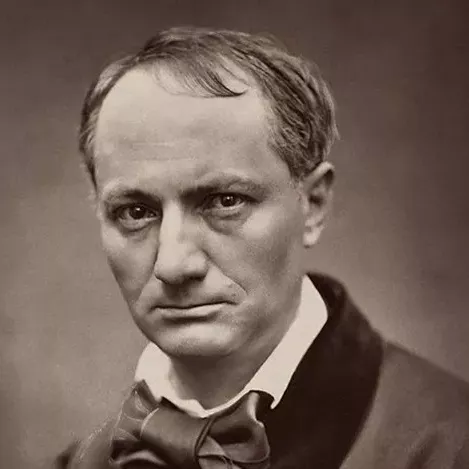
Charles Baudelaire (1821–1867), a trailblazing French poet, profoundly shaped modern literature and art with his evocative style and bold themes. Best known for his seminal work Les Fleurs du mal (The Flowers of Evil), Baudelaire explored beauty, decadence, and the complexity of human experience. His innovative approach cemented his legacy as one of the most influential poets of all time.
Charles Baudelaire Biography
Charles Baudelaire was born on April 9, 1821, in Paris, France. The death of his father, a former priest turned civil servant, when Baudelaire was just six years old, profoundly affected his early years. His mother remarried Jacques Aupick, a strict military officer, with whom Baudelaire had a strained relationship. This tension marked the beginning of his rebellious disposition.
Baudelaire received a classical education, excelling in literature and philosophy, but his defiant nature led to conflicts with authority. After a brief stint in law school, he turned to the bohemian life of Paris, immersing himself in art, philosophy, and literature. His inheritance, which he began to squander on indulgences such as extravagant living and opium, prompted his family to place him under legal guardianship to manage his finances.
In 1841, Baudelaire embarked on a voyage to India, a journey meant to discipline him. Although he never reached his destination, the trip profoundly influenced his imagination, evident in his frequent allusions to exotic landscapes in his poetry.
Returning to Paris, Baudelaire became deeply involved in the literary and artistic circles of the city. He translated Edgar Allan Poe’s works into French, recognizing a kindred spirit in the American writer’s exploration of dark themes and psychological depth.
In 1857, Baudelaire published Les Fleurs du mal, a groundbreaking collection of poetry that challenged conventional morality and aesthetic norms. Despite its brilliance, the book was met with scandal, and several poems were censored due to their controversial content. This public backlash marked a turning point, solidifying his reputation as a provocateur and visionary.
Baudelaire’s health deteriorated in his later years, exacerbated by financial struggles, substance abuse, and syphilis. He passed away on August 31, 1867, leaving behind a legacy that continues to influence poets, artists, and intellectuals worldwide.
Charles Baudelaire Poems
1. Correspondances
This sonnet encapsulates Baudelaire’s theory of correspondences, where nature and human emotions intertwine in a mystical harmony.
2. L’Albatros
A poignant metaphor for the poet’s plight, this poem contrasts the majestic albatross in flight with its awkwardness on land.
3. Spleen et Idéal
A recurring theme in Les Fleurs du mal, this section juxtaposes melancholy (spleen) with the pursuit of ideal beauty.
4. Hymne à la Beauté
This piece grapples with the dual nature of beauty—divine and demonic—and its irresistible allure.
5. Le Vampire
A dark and haunting exploration of love’s destructive power, this poem reflects Baudelaire’s fascination with gothic imagery.
6. Les Bijoux
A sensual celebration of physical beauty, this work underscores Baudelaire’s controversial embrace of eroticism.
7. Le Voyage
A reflection on the human quest for meaning, this poem examines the allure of escapism and the inevitability of death.
8. La Mort des Amants
This piece romanticizes death as a final union for lovers, showcasing Baudelaire’s macabre yet tender sensibilities.
9. Le Cygne
A lamentation on exile and change, this poem metaphorically represents Paris’s transformation and loss.
10. Une Charogne
Perhaps the most infamous of his works, this poem juxtaposes beauty with decay, challenging traditional notions of aesthetics.
Charles Baudelaire Quotes
1.”The beautiful is always strange.”
2.”To handle a language skillfully is to practice a kind of evocative sorcery.”
3.”Inspiration comes of working every day.”
4.”A multitude of small delights constitutes happiness.”
5.”The devil’s finest trick is to persuade you that he does not exist.”
6.”A man who drinks only water has something to hide.”
7.”Evil is done without effort, naturally, it is the working of fate; good is always the product of art.”
8.”An artist is someone who knows how to draw inspiration from the invisible.”
9.”Genius is childhood recaptured at will.”
10.”True civilization does not lie in gas, steam, or tables turned by spirits, but in the diminution of the traces of original sin.”
Charles Baudelaire Facts
1.Baudelaire is considered the father of modern symbolism in poetry.
2.He was one of the first French poets to experiment with prose poetry.
3.His translations of Edgar Allan Poe are considered masterpieces in their own right.
4.Les Fleurs du mal was censored, and six poems were banned until 1949.
5.He coined the term “modernity” (modernité) to describe the fleeting, ephemeral experience of urban life.
6.Baudelaire’s style heavily influenced surrealism and modern art.
7.He struggled with syphilis throughout his adult life, which deeply affected his writing.
8.He wrote critical essays on art, championing the works of Delacroix and Manet.
9.Baudelaire lived in near-constant financial instability.
10.Despite his controversial life, he was posthumously celebrated as a literary genius.
